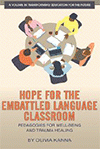
Hope for the Embattled Language Classroom
Pedagogies for Well-Being and Trauma Healing
By:
Olivia Kanna, Language College of the Immigrant Services Society of BC (ISSofBC)
A volume in the series: Transforming Education for the Future. Editor(s): Jing Lin, University of Maryland. Rebecca L. Oxford, University of Maryland. Vachel W. Miller, Appalachian State University. Amanda Jane Fiore, State Department.
Published 2023
Learning, as it is being increasingly recognized, is centrally predicated upon students’ well-being. Research findings indicate that in the instances of wounding and trauma, students’ capacity and ability to learn can be severely compromised. This understanding applies particularly to the immigrant students in the language classroom, many of whom are refugees bringing with them past experiences of privation, violence, wounding and trauma. Since teachers often find themselves wearing multiple hats, not only as instructors, but also as friends, philosophers, guides, confidantes, and counsellors to their refugee and immigrant learners, addressing those students’ trauma with compassion, and employing appropriate pedagogical practices to mitigate their suffering should be of great relevance and inform the teachers’ praxis in the classroom. This book takes an interdisciplinary look at trauma from the vantage points of critical language theories, neuroscience, psychotherapy, and Buddhist psychology, and suggests pedagogies for well-being and trauma healing that utilize contemplative ways of education. The practical aim of this book is to support teachers in addressing trauma in their classrooms.
CONTENTS
Preface. Acknowledgments. CHAPTER 1: Nowhere to Call Home: The Trauma of Displacement. CHAPTER 2: The Silent Scream of Trauma CHAPTER 3: Critical Language Pedagogies for Empowerment and Social Change. CHAPTER 4: Relating Pedagogy to Trauma. CHAPTER 5: Language Education Policies, Teachers, and the Ethics of Care. CHAPTER 6: Trauma and Healing in the Language Classroom Through Contemplative Pedagogies. CHAPTER 7: Buddhism as Brain Practice and its Role in Education. Epilogue. Appendix: Trauma Interventions: A Mini Module for Teachers. References. About the Author.
-
Paperback978-1-64802-856-4
Web price: $45.04 (Reg. 52.99)
-
Hardcover978-1-64802-857-1
Web price: $80.74 (Reg. 94.99)
- eBook978-1-64802-858-8

- EDU009000 - EDUCATION: Educational Psychology
- EDU037000 - EDUCATION: Research
- EDU055000 - EDUCATION: Violence & Harassment
-
 Apocalyptic Leadership in Education
Facing an Unsustainable World from Where We Stand
Apocalyptic Leadership in Education
Facing an Unsustainable World from Where We Stand
-
 Contemplative Pedagogies for Transformative Teaching, Learning, and Being
Contemplative Pedagogies for Transformative Teaching, Learning, and Being
-
 Critical Conversations about Religion
Promises and Pitfalls of a Social Justice Approach to Interfaith Dialogue
Critical Conversations about Religion
Promises and Pitfalls of a Social Justice Approach to Interfaith Dialogue
-
 Fallow Lands of Plenty
Public Schools as Leaders in Rural Food System Relocalization
Fallow Lands of Plenty
Public Schools as Leaders in Rural Food System Relocalization
-
 Re-Envisioning Higher Education
Embodied Pathways to Wisdom and Social Transformation
Re-Envisioning Higher Education
Embodied Pathways to Wisdom and Social Transformation
-
 The Wisdom Way of Teaching
Educating for Social Conscience and Inner Awakening in the High School Classroom
The Wisdom Way of Teaching
Educating for Social Conscience and Inner Awakening in the High School Classroom
-
 Toward a Spiritual Research Paradigm
Exploring New Ways of Knowing, Researching and Being
Toward a Spiritual Research Paradigm
Exploring New Ways of Knowing, Researching and Being

